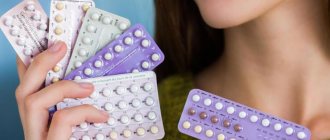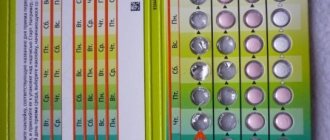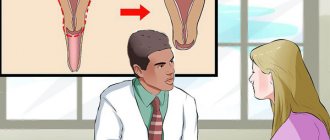When is COC withdrawal indicated?
Modern women have a reliable and effective method of preventing unwanted pregnancy - combined oral contraceptives. Gynecologists indicate that you can take COCs continuously for many years and discontinue the drug only when planning a pregnancy. However, there are other situations when a woman has to think about stopping taking the pills.
Indications for immediate discontinuation of COCs:
- Onset of pregnancy.
- The appearance of severe migraine.
- Sudden deterioration or loss of vision.
- Acute liver diseases.
- Development of acute thromboembolic complications.
- Hypertension that is difficult to treat with medications.
- Immobilization for a long time (consequences of limb fractures, etc.).
- Upcoming planned surgery.
- Significant weight gain in a short time.
- Diabetes mellitus with the development of complications.
- Detection of a malignant tumor of any location.
- Progression of uterine fibroid growth.
It is important to know:
- If serious complications develop due to COCs (thrombosis, thromboembolism), you must immediately stop taking the drug and consult a doctor.
- If there is a slight deterioration in the condition that is not life-threatening, you should finish the package of the drug, but do not start a new one. Consultation with a doctor is required.
A woman can stop taking birth control pills for quite prosaic reasons: she got tired, found a more convenient option, or lost the need for protection (for example, when breaking up with her partner). In all these situations, you need to clearly know the rules for stopping the drug, so that you do not subsequently have to deal with the undesirable consequences of such a decision.
The effect of birth control pills on the female body
Women think that after stopping contraception it will take a long time to conceive.
But research shows pregnancy rates are similar to those who used barrier methods (such as condoms). During the first year, in 96% of former pill users, the delay after discontinuation of OCs was caused by conception. And in another study, half became pregnant within six months. When using hormone pills, the body adapts to constantly receiving a certain dose of synthetic hormones. In this regard, withdrawal is perceived as stress. The brain receives a signal that it is necessary to activate the pituitary gland and ovaries. However, the process of restoring the natural functions of the body takes several months.
Despite the fact that a short absence of menstruation is one of the body’s normal reactions, this phenomenon cannot be ignored. If you don’t have your period, you should consult your doctor, as there are other reasons for stopping your monthly discharge:
- Physical or mental stress. The body perceives physical activity and stress as a threat to future offspring. In this regard, processes associated with reproductive abilities are suspended.
- Rapid weight change. Fat deposits are a unique method of regulating hormone levels. Changes in physical parameters lead to hormonal imbalance.
- Inflammatory processes in the body. The greatest impact is exerted by diseases with a focus of inflammation in the pelvic organs.
- Physiological decrease in reproductive capacity. After age 45, women experience menopause, when menstruation stops forever.
- Taking medications.
- Poor nutrition. The functionality of the reproductive system depends on the timely intake of certain vitamins and microelements into the body. If a woman eats poorly, changes in the menstrual cycle occur.
First, let’s define what is generally considered a delay. There are different opinions on this matter.
Following this opinion, if there is a delay of up to 5 days, you don’t have to worry too much.
Contraceptives are synthetic analogues of female sex hormones - estrogens and progesterone. In this case, we will only talk about those drugs that are taken orally in the form of tablets, and are called combined oral contraceptives (COCs). Currently, COCs are the most effective way to protect against unwanted pregnancy and have a number of advantages over other types of contraception:
- high reliability when used correctly;
- reversibility of action;
- a wide selection of drugs on the pharmaceutical market;
- regulation of the menstrual cycle;
- non-contraceptive effects (improvement of skin, hair condition);
- reducing the risk of developing gynecological diseases.
Let’s say that a woman has decided to stop taking “hormones” and wants to become a mother, or wants to use other means of contraception. What happens after you stop taking birth control pills? How will the ovaries react to this after sleep? Let’s immediately make a reservation that in this case, “withdrawal” of the drug means a planned cessation of taking pills after a full cycle (that is, when all the pills from the package are “drunk”).
Sometimes it happens that the process of “awakening” the ovaries is delayed and then there is a delay in menstruation after stopping birth control. Although, provided that the woman does not have any pathology, this happens extremely rarely. Because the female reproductive system is evolutionarily configured to reproduce offspring.
It’s another matter if, while using COCs, pills were missed, or the contraceptive was stopped altogether “in the middle of the package.” This happens when, for example, a woman has suffered stress, joy, etc. and forgot that she was supposed to take pills, or decided to interrupt hormonal contraception on her own because she did not tolerate the drug well.
So, in what cases does a delay occur after taking birth control?
- The first thing to rule out in such a situation is pregnancy. Some factors, such as diarrhea, vomiting, alcohol, changes in time zones or climate, as well as simply missing a pill, reduce the effectiveness of COCs. And the contraceptive effect decreases.
- It is not uncommon to experience a delay in menstruation after taking emergency contraception. Especially when used uncontrolled. The fact is that “firefighter contraceptives” contain a very high dosage of hormones, which is a powerful stress for a woman’s ovaries. The consequence of “withdrawal syndrome” may be a delay in menstruation after taking Postinor.
- There is a high probability that very young people, women over 40 or closer to menopause will experience “no periods” after stopping birth control. Menstrual function in women over 40 years of age and older recovers more slowly and more difficultly due to age-related changes in the body, and in young girls, cycle disruptions occur due to the immaturity of the reproductive system. But these problems are short-term, provided that there is no other pathology.
- Unauthorized stopping of taking pills, as mentioned above, is also a cause of menstrual delays.
- Inflammatory diseases of the genital area also lead to irregular periods.
All modern COCs (whether Jess, Yarina, Lindinet, Qlaira, Regulon, Diane-35, Novinet, Belara) are classified as monophasic drugs containing the same dose of estrogen in each tablet and differ in the gestagen component. The only difference is that some of them (for example, Jess, Yarina, Diane-35) also have an antiandrogenic (cosmetic) effect.
Note! A delay in menstruation may occur due to discontinuation of any of these drugs, especially if:
- there was a missed pill or the time of taking was shifted;
- reception was stopped without permission, packaging was not completed;
- during use, vomiting, diarrhea, alcohol consumption, and combination with antibiotics are observed;
- Against the background of reception, there are strong shocks, changes in climatic conditions or time zones.
Rules for canceling COCs
When visiting a gynecologist, many patients complain that they are afraid of the consequences of discontinuing the contraceptive. In fact, with the right approach, you can stop taking pills without fear for your health. To do this, you must follow certain rules:
- Before stopping use of COCs, be sure to consult with a qualified healthcare professional. There are situations when refusal of hormonal contraceptives leads to a deterioration in women's health (if birth control pills were prescribed for therapeutic purposes).
- You need to stop taking the contraceptive when the last pill in the blister is gone. If there are no indications for emergency discontinuation of the drug, you should finish the package to the end, strictly observing the interval between tablets (24 hours). It should be remembered that abruptly stopping the contraceptive in the middle of the cycle can become a great overstrain for the reproductive system. After such withdrawal, heavy bleeding often begins.
When will your period (menstruation) appear after you stop taking OK?
Women should remember that hormonal-type oral contraceptives affect the production of hormones and in every possible way prevent the onset of ovulation, which means that it may take some time before the next menstrual cycle begins after stopping taking oral contraceptives. Especially often, a delay in the menstrual cycle after stopping the OC occurs in the case of a rather long period of taking birth control pills, or when oral contraceptives are taken by young girls or older women. Typically, complete restoration of a woman’s hormonal balance after stopping oral contraceptives occurs three months after taking the last contraceptive pill.
Why you shouldn’t suddenly stop taking COCs
Sudden refusal of combined oral contraceptives can provoke the development of the following complications:
- Breakthrough bleeding from the genital tract.
- Spotting bloody discharge.
- Delayed menstruation.
- Menstrual irregularities in the coming months.
- Deterioration of skin and hair condition.
- Return of symptoms of the underlying disease (if COCs were prescribed for therapeutic purposes).
If birth control pills are abruptly discontinued in the first half of the cycle, an unwanted pregnancy may occur. It's simple: in the first two weeks, the woman was sexually active, trusting the contraceptive, and the drug coped with its function - exactly until the moment of discontinuation. If you stop taking COCs in the first 7-10 days after starting the package, you can trigger the maturation of the follicles. Hormones stop regularly entering the body, the gonads “wake up”, and the pituitary gland begins to work as usual - stimulating the growth of follicles, the selection of the dominant one among them, and ovulation.
It takes 6 days for follicles to mature. Sperm live in a woman's genital tract for up to 7 days. Abrupt cancellation of oral contraceptives the day after intimacy can, with some probability, lead to an unplanned pregnancy.
How birth control affects your periods
The content of the article:
The principle of operation of oral contraceptives is the suppression of ovulation. In addition, they prevent the egg from attaching to the surface of the endometrium of the uterus. This occurs against the background of constant use and intake of synthetic hormones into the body. Ovulation after birth control is in an artificial “sleep” .
Are you taking birth control pills?
YesNot yet
Sex hormones are called bioactive components. Their main function is to determine male and female sexual characteristics.
People have two types:
- Hormones that are produced by the ovaries. Their function: the formation of female characteristics, sexual desire and the menstrual cycle.
- Hormones that are produced by the corpus luteum of the ovaries and the adrenal cortex. They ensure conception.
These hormones are responsible for the monthly menstrual cycle, during which an egg is formed in the ovary and the process of ovulation occurs.
The effect of hormonal drugs on the body is to suppress the ovulatory activity of the pituitary gland, which is responsible for the production of hormones. While taking contraceptives, the pituitary gland undergoes a kind of “rest”, and the female gland enters the phase of “false pregnancy” due to hormonal disorders. The “sleep” of eggs makes fertilization and conception impossible. That is why a woman does not have periods after taking birth control pills.
See also: Phases of the menstrual cycle: daily diagram
In addition, such contraceptives contain gestagens - steroid hormones . Under their influence, the amount of vaginal mucus changes, it becomes more viscous, so sperm simply cannot enter the uterine cavity. Under the influence of gestagens, the thickness of the endometrium also changes, and the mobility of the fallopian tubes decreases. This prevents the egg from implanting (invading) the endometrium.
The effect of hormonal contraceptives
After taking 21 tablets from the package, you should take a break. The day after the last pill taken, menstruation begins. During this period, medications are not taken.
Many women refuse to take hormonal medications because they think they will gain weight. It's a delusion. The amount of hormones contained in the tablets cannot cause weight gain. Body weight may increase by 2 kg during the first three months due to fluid retention. After this time, the hormonal levels will be restored and the weight will stabilize.
How does the menstrual cycle change after stopping COCs?
Usually the cycle is restored within 3 months. In the first 1-2 months after stopping taking birth control pills, periods may come with a slight delay and be scanty. There is no need to worry - this is a common condition after stopping birth control pills. After 3 months, the menstrual cycle should be restored, and then your periods will come as usual.
Most often, in the third month after stopping the contraceptive, signs of PMS return: headaches, sudden mood changes, irritability, engorgement of the mammary glands.
One of the common consequences of improper discontinuation of birth control pills is the development of amenorrhea. Menstruation does not come at all, which becomes a reason for a visit to the doctor. Gynecologists warn: after stopping taking COCs, periods may be absent for up to 1.5-2 months. This is how the body reacts to changes in hormonal levels, and this is considered a common consequence of drug withdrawal.
If menstruation is delayed:
- Take a pregnancy test or donate blood for hCG.
- If pregnancy is confirmed, contact a gynecologist. It should be remembered that when COCs are discontinued, the ovaries begin to work harder, and the likelihood of conceiving a child increases significantly.
- If pregnancy is not confirmed, you can safely wait for your period. If your period is delayed by 1.5-2 months or more, you should see a doctor. To normalize the menstrual cycle, hormonal medications and physical therapy may be prescribed.
Why no periods after stopping birth control pills?
If you decide to stop taking the pills, it may take some time for your cycle to return to normal. This period is individual for each woman. Some return to their normal menstrual cycle in a matter of days, while others take several months for their periods to regulate. In addition, each body reacts differently to changes associated with internal and external factors. Hormone levels fluctuate for many reasons. The absence of menstruation after discontinuation of OCs can be caused by the presence of at least one of the following negative factors:
- Stress increases the level of cortisol, which is also called the “stress hormone.” It affects the hypothalamus, a gland that controls many hormonal functions in the body. As a result, hormonal imbalance may occur. Stress also creates a vicious circle: a woman worries about a missed period, the level of hormones in her body fluctuates, which further reduces the likelihood of getting her period. That's why many doctors recommend taking a pregnancy test in such a situation - urine or blood - to restore peace of mind. Any situation that causes stress can trigger a cycle failure. Final exams, problems at work, illness of a loved one, moving - can cause a disorder in the monthly cycle.
- Long-term use of hormonal contraception. One of the effects of long-term use of hormonal birth control is the thinning of the lining of the uterus, the endometrium. This may eventually lead to no periods for some period.
- Sexual infections. The hormonal method protects a woman from unwanted pregnancy, but is not able to protect her from sexually transmitted infections. Ovarian dysfunction can develop even with a minor inflammatory process. This may affect your menstrual cycle when the drug is stopped.
- Diets. Excessive calorie restriction can lead to hormonal imbalance and negatively impact your menstrual cycle because the body will not receive the nutrients it needs to produce hormones properly.
- Dramatic weight loss. Did you know that cholesterol is needed to produce sex hormones? And this is so. An abnormally low percentage of body fat can wreak havoc on your hormones. Women who are overweight or underweight may experience a variety of hormonal problems, including missed periods.
- Excessive physical activity. Even in women who do not use OCs, excessive exercise can cause delayed or absent menstruation. Intense sports often disrupt hormonal levels and the menstrual cycle. Professional female athletes tend to suffer from amenorrhea, but even amateur athletes can experience this effect.
All organisms are different, and the specific effect after stopping contraception may depend on the symptoms that were observed in the woman before starting to take the pills. But some changes are general:
- More heavy and painful menstruation. If you had pain and heavy bleeding before you started using birth control, your problems are likely to return. Antispasmodics (No-shpa, Spazmalgon) or non-steroidal anti-inflammatory drugs (Ibuprofen) will help cope with pain and improve well-being. If this has not been observed before, you should wait 1-2 cycles, allowing the discharge to normalize after hormonal fluctuations due to discontinuation of the OC. Heavy periods that bother a woman for a longer period of time require additional examination by a gynecologist.
The first few menstruation after discontinuation of OC may be more abundant, later they should normalize
- PMS symptoms. The pill, especially some formulas, helps balance out hormonal chaos that can cause depression, anxiety and irritability. Without their action, symptoms may return.
- Cramps in the lower abdomen in the middle of the cycle. Most hormonal birth control methods work by preventing ovulation. Therefore, as your body returns to its natural functions, you may feel slight cramping in your lower abdomen as your ovary releases an egg. At the same time, periods may become more abundant than when using OK.
- Acne and unwanted hair. The pills can correct the hormonal imbalance that causes your skin to break out and hair to grow in unwanted places. But this is a temporary solution: as soon as you stop taking the OC, the hormones can go out of whack again, which will bring back these problems.
- Increased sexual desire. A small percentage of women find that the pill reduces their libido. After stopping contraceptives, they note an increase in interest in sexual activity.
- Reduced frequency of migraines. If the pills are causing you headaches, you will find relief when you stop taking them.
Most symptoms that begin after you stop taking birth control are temporary. After a few menstrual cycles, your body should regain its normal rhythm and your periods will return to normal.
Reasons for the absence of menstruation after discontinuation of OK - video
COC withdrawal syndrome: undesirable consequences
When a woman takes combined oral contraceptives for medicinal purposes (for the treatment of diseases of the genital organs or normalization of the menstrual cycle), withdrawal syndrome occurs against the background of a sudden refusal of the drugs. In such a situation, the patient not only returns to the previous manifestations of the disease, but also intensifies.
Most often, women are concerned about the following complaints:
- The appearance of rashes and pimples on the skin.
- Development of weakness, irritability or even persistent depression.
- Decreased libido.
- The occurrence of breakthrough uterine bleeding.
- The appearance of acyclic bleeding (outside of menstruation).
- Increased work of the sweat and sebaceous glands with the appearance of acne.
- The appearance of excessive hair growth.
- Development of headache.
- Nausea and vomiting.
If such symptoms appear, it is recommended to consult a gynecologist.
How do birth control pills work?
There are two types of oral contraceptives. The first combines artificial forms of the hormones estrogen and progesterone. The second is a mini-pill, containing only progestin. Oral contraceptives are supplied in packs of 28 tablets each. The first three weeks, or 21 tablets, contain hormones, and another 7 tablets contain placebo.
How does taking hormonal pills help prevent pregnancy:
- prevents ovulation;
- thickens cervical mucus so that sperm cannot reach the egg;
- makes the lining of the uterus thin to prevent the attachment of the egg.
By taking the pills at the same time every day, you maintain stable hormone levels in your body. A placebo helps you remember to take your pill by maintaining your dosage regimen every day, regardless of the time of month. If you accidentally miss a dose, you may notice light spotting or slight bleeding outside of your cycle.
What to do if the menstrual cycle does not return?
If, after stopping COCs, your periods do not come, a logical question arises: why did they disappear? There are several reasons why they are missing:
Onset of pregnancy
Withdrawal syndrome sharply increases the likelihood of a healthy woman conceiving a child, since a kind of reboot of the reproductive system occurs. Pregnancy can occur as early as the first menstrual cycle. After fertilization occurs, the physiological disappearance of menstruation occurs.
Menstrual irregularities
If there is a sudden cessation of taking COCs, a hormonal imbalance occurs. Spotting and spotting appears, which the woman easily mistakes for menstruation. When she calculates the length of the cycle, the number of days increases to almost 50 days. After discontinuation of the drug, experts recommend that women begin counting menstruation from the first days of full-fledged bleeding.
Amenorrhea
A small proportion of women experience amenorrhea – absence of menstruation – after stopping the use of oral contraceptives. This is believed to be an adverse effect caused by the use of COCs. The cause of the phenomenon is impaired activity of the hypothalamic-pituitary system with subsequent failure of hormone production.
If amenorrhea is observed for 3 months, it is recommended to consult a women's doctor and endocrinologist to find out the cause and select a method of therapy.
Diseases of the reproductive system
Combined oral contraceptives cannot protect a woman from sexually transmitted infections (chlamydia, mycoplasmosis, gonorrhea, etc.). If inflammation begins in the reproductive organs, a disorder of the menstrual cycle occurs with a delay in menstruation. To identify an infection, you must be examined by a doctor.
Ovarian and thyroid dysfunction
With pathology of the endocrine organs, hormone production fails, which leads to a change in the cycle. It often turns out that COCs were prescribed against the background of existing problems. Taking hormonal drugs suppressed the development of the disease, but after discontinuation, rapid progression of the pathology occurred. In this situation, you cannot do without the help of a specialist.
Periods while taking birth control pills
When using correctly selected contraceptives, menstruation occurs regularly. In the first 3-6 months of therapy, periodic spotting is allowed. This is how adaptation to the drug occurs.
When taking birth control, your period starts every 28 days. The patient takes hormones for 21 days, and then takes a week break. During this period, menstrual-like bleeding begins. Due to the decrease in hormone levels caused by stopping the drug for a week, the endometrium begins to be rejected.
Patients taking oral contraceptives (OCs) note that their periods are easier. The volume of blood released decreases, the duration of menstruation shortens, and pain disappears.
No periods while taking birth control pills
The absence of menstruation due to the use of drugs is a reason for an unscheduled visit to a gynecologist. If your period does not start within 6 days after stopping birth control, pregnancy must be ruled out. If the test turns out to be positive, then you should not start the next package. It is not necessary to have an abortion because a woman took oral contraceptives during pregnancy. In the first days after fertilization, they do not have a negative effect on the embryo.
In rare cases, your period will stop after you start using birth control. This is an individual reaction of the body to synthetic hormones entering the body from the outside.
My period does not end when I take birth control pills
One of the common side effects that occurs after starting birth control treatment is intermenstrual bleeding. Women may experience spotting during 3-6 months of using oral contraceptives.
The appearance of blood does not reduce the effectiveness of the drug, but the patient’s quality of life worsens. This situation occurs most often when taking microdosed OCs. The continuation of intermenstrual bleeding for 4 months after the start of therapy indicates that it is better to replace the selected contraceptives.
If a woman comes to the gynecologist with complaints that she has started taking birth control pills, but her period does not end, then an examination and examination is required.
You should be wary of the situation when the discharge throughout the entire cycle does not differ in abundance from normal menstruation. A condition is considered dangerous when the abundance of discharge increases, pain appears in the lower segments of the abdomen, and the general condition worsens.
Attention! It is prohibited to stop using contraceptives on your own in the middle of the package. This will lead to increased bleeding and hormonal imbalance.
Scanty periods when taking birth control pills
When taking OK, the intensity of menstruation decreases. With hormonal therapy, the standard volume of menstruation for all days of menstruation is 40-80 ml.
Scanty periods are normal. At the same time as the volume of discharge decreases, its duration decreases. This is due to the fact that after you start using hormones, your periods disappear. Bleeding when discontinuing OCs is menstrual-like bleeding caused by endometrial rejection.
Bleeding mid-cycle while taking birth control pills
If your period begins while taking birth control pills, this is a sign of a lack of hormones in the chosen drug. After all, COCs contain the minimum permissible amount of hormones. The appearance of blood indicates that the dose contained in the tablets is not enough to suppress the production of estrogens and gestagens in the body.
If a period-like discharge begins at the beginning or middle of the contraceptive pack, this indicates a lack of estrogen. The appearance of blood towards the end of the package is a sign of a lack of gestagens.
But the COC should be changed after the adaptation period has passed. In most patients, the spotting disappears after 3 months of regular use of the tablets.
Heavy periods while taking birth control pills
Intense menstrual-like discharge during the use of hormonal contraceptives is breakthrough bleeding. They arise due to endometrial atrophy under the influence of progestogens. The pathological condition develops during the process of adaptation of the uterus to hormonal medications. The small amount of estrogens contained in COCs is not enough to perform the hemostatic function.
Attention! Excessive breakthrough bleeding may occur if the regimen of use of the drug is violated, diarrhea or vomiting (due to deterioration in the absorption of the active components).
In such a situation, it is recommended to double the dose of hormones until the condition stabilizes.
Painful periods when taking birth control pills
When using oral contraceptives, menstruation stops. Bloody discharge occurs after temporary withdrawal of hormones. Endometrial detachment goes almost unnoticed. There may be slight pulling sensations associated with contraction of the uterus and opening of its cervix.
Rebound effect
When a patient starts taking COCs, the natural function of the ovaries is inhibited, which is to prepare the female reproductive cell for fertilization. This effect occurs due to inhibition of the hypothalamic-pituitary system, which, with the help of produced hormones, controls the functioning of the ovaries. During the use of birth control pills, the activity of the sex glands is suspended, and the sensitivity of receptors to hormones increases.
If a woman stops taking combined oral contraceptives, the functioning of the reproductive system is restored and hormones are produced in large quantities. This greatly increases the possibility of full maturation and release of an egg ready for conception from the follicle. Experts compare this phenomenon with superovulation. This method is especially suitable for patients with endocrine infertility, in which dysfunction of the reproductive system does not occur due to a lack of their own sex hormones.
Gynecologists prescribe combined oral contraceptives not only to prevent unwanted pregnancy, but also for therapeutic purposes. Short-term use of COCs (3-6 months) allows you to activate the ovaries, trigger ovulation and achieve conception of a child while discontinuing the drug.
Contraceptive drugs - individual for each woman
Minor bleeding begins a few days after stopping taking the OC and lasts about seven, maximum fourteen days.
Such changes in the body are called withdrawal syndrome. The reason for a visit to the gynecologist should be heavy discharge during this period, accompanied by pronounced pain and weakness.
Scanty or excessively heavy discharge during the period of stabilization of the cycle is considered normal, but if after several months the situation does not change, you need to be examined by a gynecologist. Such abnormalities may indicate serious health problems.
The absence of menstruation after stopping OC is considered normal. The duration of the recovery process can be up to three months. If the cycle does not stabilize after six months, you need to conduct a full examination and identify the problem.
In many ways, the timing at which menstruation should begin depends on factors such as:
- type of oral contraceptives and duration of their use;
- age;
- body condition and history of gynecological diseases.
The cycle is restored faster in young girls, but in women approaching menopause, it may not stabilize at all. In case of suppressed immunity, it will take about six months to normalize the functions of the ovaries.
After one, and sometimes two months, the first menstruation appears after OK. Due to the fact that while taking the drug, the discharge was scanty, during this period it can become abundant. This is due to hormonal imbalance.
Excessively heavy periods can lead to anemia, as the amount of blood lost increases significantly. In this case, there is a deterioration in the general condition, weakness and dizziness. During this period, it is recommended to start taking medications that contain iron.
In cases where the appearance of heavy bleeding was preceded by a delay, there is no cause for concern. In a short time the cycle stabilizes. You should consult a gynecologist only when such menstruation bothers you for a long time. There is a risk of bleeding.
In most cases, after completing the use of OK, the cycle becomes stable. Violations are observed only in those women who have previously had irregular, scanty menstrual flow.
In addition, the cause of scanty discharge may be:
- pregnancy;
- prolonged absence of menstruation;
- genitourinary system infections;
- polycystic disease;
- cancerous formations.
To exclude the development of pathologies, it is recommended to undergo examination by a gynecologist.
The first period after birth control often lasts more than a week. This process should not cause concern in women and is considered normal, but only if the discharge is scanty and not accompanied by severe pain.
If you find clots in your menstrual blood or your general condition worsens, you should go to a gynecologist to prevent bleeding.
The instructions for using the pills do not indicate how to properly stop taking them. Doctors suggest that you can stop taking the drug at any time. There are several recommendations for canceling OK:
- It is advisable to stop using the product after finishing the last pack;
- reduce the dose gradually.
The consequences of stopping oral contraceptives almost always appear. A temporary change in the functioning of the hormonal system brings slight discomfort, which is expressed differently in each woman.
To stop taking OCs without consequences in the form of adverse reactions, you must:
- Discuss cancellation with your gynecologist. Very often, the drug is prescribed to correct hormonal levels, and in order to stop drinking them, you need to evaluate your health.
- It is not recommended to abruptly stop using them in the middle of the cycle, as this may lead to hormonal imbalances, which can lead to bleeding.
- Strictly adhere to the regimen proposed by the doctor to safely complete the use of contraceptives.
Emergency cancellation
OC withdrawal syndrome can cause different reactions in the body. Abrupt withdrawal causes cycle disruption and breakthrough bleeding occurs.
Emergency termination is recommended only for serious illnesses:
- hypertension, severe headaches;
- before surgical operations;
- liver dysfunction;
- for malignant tumors.
It is possible to not finish the package only in extraordinary cases. With a sudden interruption of OK, withdrawal syndrome is inevitable.
When do you start your period after stopping birth control pills? Oral contraception leads to the suppression of ovulation, which automatically leads to the inability of the uterus to fertilize. Therefore, if after taking the drugs there is no menstruation, then women should not panic. This occurs due to temporary inhibition of ovarian function as a result of the use of artificial hormones. When the process does not resume within several months, you need to contact a gynecologist.
The selection of oral contraceptives is carried out in accordance with the woman’s phenotype. If estrogens predominate in her body, then the girl belongs to the estrogenic type. They have: soft forms, slight fullness and long periods. She can be prescribed the following drugs: Rigevidon, Minulet, Anteovin.
It is better for women of the gestagenic type to take: “Ovidon”, “Janine”, “Chloe”, “Yarina”.
Girls whose bodies have hormones in a harmonious ratio are prescribed: “Marvelon”, “Regulon”.
A common reason why there are no periods after stopping birth control is pregnancy. Fertilization occurs for a number of reasons:
- non-compliance with the regimen of taking pills (missed a day or different times of taking);
- hormonal disbalance;
- taking antibiotics;
- bad habits (alcohol, smoking).
If the test result is negative, then the reasons why there are no periods after birth control pills may be different. Most often this is due to the functioning of the reproductive system. When canceling contraceptives, cycle disruption is an acceptable norm. The body needs time to restore the functions of the pituitary gland so that all hormones are produced in the right quantities and on time, which is why there is a delay.
However, if contraceptives were taken for a short time, then restoration of the uterus and ovaries (regular menstrual period with ovulation, formation of the corpus luteum and proliferation of the endometrium) occurs within 1–3 months.
If menstruation does not begin for several months, then this is an alarming signal about other disorders occurring in the body. This will require a full examination, not only of the reproductive system, but also of the thyroid gland, which is responsible for the production of hormones.
Why does my period get delayed after stopping birth control pills? Medicines help women prevent unwanted pregnancy, so they must be taken strictly on schedule. If you miss even one dose, various problems may arise in the body. This could be an unexpected pregnancy or menstrual irregularity.
The drugs include levonorgestrel, which is considered a synthetic analogue of the estrogen hormone. It can disrupt the body's hormonal levels and cause unwanted changes in it. One of these disorders is considered to have a negative impact on a stable menstrual cycle.
We suggest you familiarize yourself with the Diet after resection of the tail of the pancreas
When choosing drugs, you need to pay attention to their composition. In the absence or presence of synthetic hormones in them, the following consequences can occur:
- change in the schedule of menstruation: they begin later and are accompanied by heavy discharge;
- sudden change in weight;
- lack of sexual desire.
When the drug is chosen correctly, the female body adapts to it in the first months. After this, the bleeding returns to normal and the 28-day cycle begins.
If a woman has finished taking OK, her periods may be irregular, heavy or scanty, and quite often there is a delay. Violation of the cycle is explained by one of the factors:
- the body goes through a recovery stage, as it is forced to produce hormones that it previously received from oral contraceptives;
- disruption of the glands - if the natural production of hormones fails, discharge may be completely absent or very intense;
- pregnancy;
- diseases of the reproductive organs;
- polycystic ovary syndrome, caused by changes in hormonal levels due to the use of contraceptives.
Many women are concerned: when will their periods come after stopping birth control pills? Oral contraceptives are taken not only to prevent unwanted conception, but also for treatment purposes. With hormonal imbalances in the body, the following diseases can occur:
- heavy bleeding;
- lack of ovulation process;
- polyps;
- uterine diseases;
- endometriosis.
In such cases, a woman needs to take birth control pills. Thanks to them, menstruation becomes regular and the amount of discharge is reduced. The duration of therapy is prescribed by the doctor.
Didn't get your period after stopping birth control? Such drugs do not always have only a positive effect on the body. At the beginning of treatment, some adverse reactions occur, which may subside during therapy. Some phenomena can be highlighted:
- cessation of menstruation;
- swelling of the legs;
- headache;
- increase in body weight.










